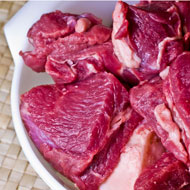Curb rise in non-stun slaughter, says Lord Trees

EU law dictates that all animals must be stunned before slaughter, but exceptions apply for the Muslim and Jewish faiths.
Alexander Trees, the only veterinary surgeon in the House of Lords, is urging the government and religious leaders to take steps to curb the rise in animal slaughter without pre-stunning.
The comments come in the wake of recent figures from the Food Standards Agency (FSA), which suggest the number of sheep and poultry not stunned has been rising in the UK. Over three million sheep are slaughtered without pre-stunning each year, which represents a rise of around 50 per cent between 2011 and 2017. The number of non-stunned cattle declined over the same period.
EU law dictates that all animals must be stunned before slaughter, but exceptions apply for the Muslim and Jewish faiths. Writing an editorial in today’s Vet Record (16 February), Lord Trees highlighted concerns that much of the meat from non-stunned animals is making its way into the standard food chain.
Whilst environment secretary Michael Gove has announced a number of progressive animal welfare measures in recent months - including compulsory CCTV in all slaughterhouses - Lord Trees said now is the time to address ‘the elephant in the room’.
He acknowledged that this is ‘a difficult issue because of its religious dimension’ but pointed out that many imams and halal authorities accept reversible stunning, and the majority of halal meat in the UK is stunned before slaughter - 63 per cent of sheep and 75 per cent of cattle.
Whilst the BVA and many in the government would prefer that all animals are stunned before slaughter, demanding a ban is problematic, politically and possibly legally.
Lord Trees continued: ‘Personally, I have preferred that we marshal public opinion and seek to persuade the relevant religious leaders to reconsider their historic position - a position based on public health measures that were sound many hundreds of years ago but are now archaic and insupportable.
‘The religious leaders have the power to end the practice of non-stun slaughter and the onus to do so should be firmly put at their door.’
Meanwhile, he called for several measures ‘against which there can be no rational or legal objection’. These include installing CCTV in all abattoirs and clear labelling to allow consumers to avoid meat from non-stunned animals if they wish. There is also a need to accurately determine the amount of meat needed for religious communities who require non-stunned slaughter, in order to ensure that only sufficient numbers of animals are killed without pre-stunning.
Lord Trees concluded with a rallying cry to vets: ‘If ever there was an issue on which the veterinary profession could unite, this is surely it. Let our voices be heard loud and clear.’



 The Federation of Independent Veterinary Practices (FIVP) has announced a third season of its podcast, Practice Matters.
The Federation of Independent Veterinary Practices (FIVP) has announced a third season of its podcast, Practice Matters.